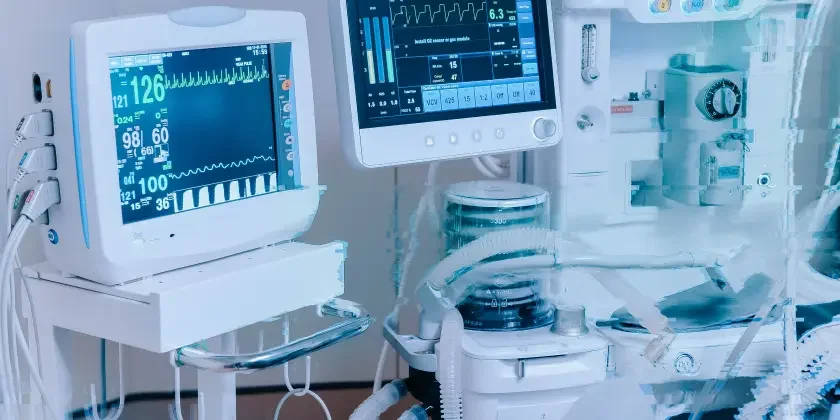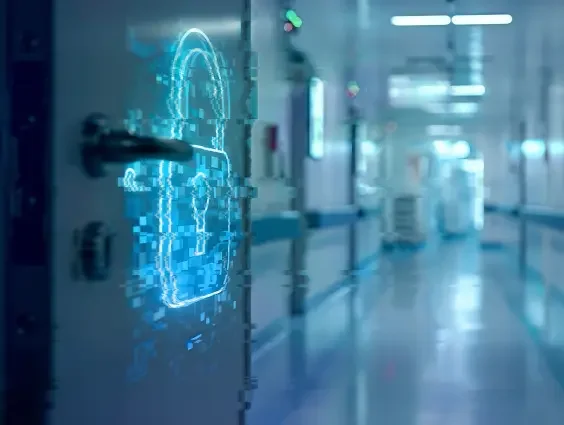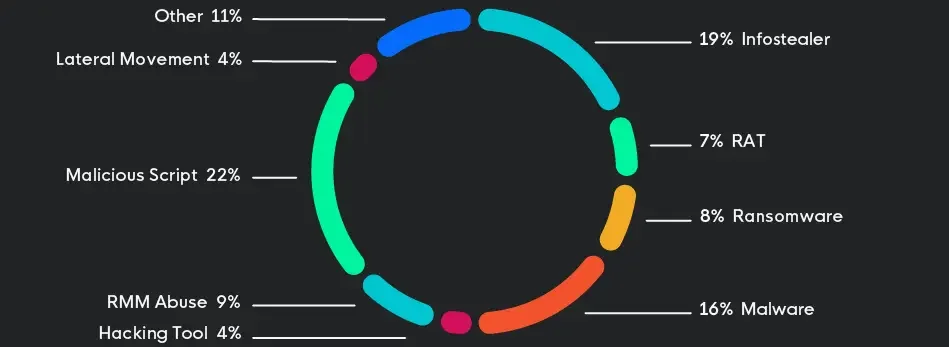In fact, hospitals and healthcare facilities are among the most targeted industries for cyberattacks. Cybercriminals are hungry for sensitive information like patient records and financial data, and when systems go down, lives are at stake, not just profits.
Cybersecurity for hospitals is critical.
Threats Targeting Healthcare
Why cybersecurity for hospitals is more critical than ever
The number of cyberattacks on hospitals isn't just increasing; they’re becoming more sophisticated. Cybercriminals know healthcare facilities can't afford downtime, making them vulnerable to ransomware attacks and data breaches.
Patient safety: When systems go down, lives are at risk.
On average, hospitals face 15 to 23 days of downtime after a cyberattack downtime for hospitals is between 15 to 23 days after an attack. This puts patients' lives at risk as many treatments depend on technology.
Regulatory compliance: HIPAA doesn't mess around.
Data breaches and leaking protected health information (PHI) can get you hit with hefty fines and lawsuits.
Financial losses and reputational damage
The average all-in, post-incident cost of a cyberattack is more than $4.5 million, and experts suspect it will only get worse as cybercriminals get more crafty. And this doesn't even take into account the damage to your reputation. In an industry where patient trust is everything, healthcare facilities that don't prioritize their IT infrastructure and cybersecurity posture risk destroying their public image and credibility. This is a common cybersecurity issue in healthcare.



The cost of cyberattacks on hospitals
92%
Of healthcare organizations experienced a cyberattack in the past 12 months, up from 88% in 2023. (Source)
22%
Of healthcare organizations recovered from ransomware attacks within a week in 2024, down from 47% in 2023, indicating prolonged recovery times. (Source)
$2.57M
average cost of recovery from a ransomware attack in the healthcare sector in 2024, up from $2.2 million in the previous year. (Source)
61%
of healthcare data breach threats originated from negligent employees. (Source)

Common cyber threats facing hospitals
As relentless as working overnight in a busy Emergency Room, threat actors are targeting hospitals more and more. Here are the biggest threats:
Ransomware attacks: Hackers lock down hospital systems and demand a ransom to stop them from releasing PHI and other confidential data.
Phishing schemes: Cybercriminals will try to trick hospital staff into handing over login credentials through deceptive emails.
Medical device exploitation: Medical devices connected to the internet open the playing field for hackers trying to gain unauthorized access to hospital systems and networks.
Insider threats: Hospital staff with evil intentions, careless attitudes, or fatigue due to overwork pose a security risk by mishandling data or devices.
Distributed Denial-of-Service (DDoS) attacks: A group of cybercriminals and hackers will sometimes band together to overwhelm hospital networks with traffic and take them offline at critical moments.


Ready to learn more?
Schedule a demo to see how Huntress can help protect your hospital and patients. In this short demo, you'll get to:
- Explore the Huntress dashboard and platform
- Learn about core services, features, and incident reports
- Ask Huntress experts any questions you might have!
Cybersecurity best practices for hospitals
A solid cybersecurity posture starts with the basics. From authentication methods to how your team responds to incidents, start with these essential questions:
A username and password aren’t safe enough anymore. MFA adds an extra layer of security, making it harder for threat actors to break into systems and networks.
Fixing vulnerabilities before cybercriminals can exploit them is like preventative care—it's better to be proactive than reactive. Make sure that operating systems and devices are always up-to-date.
Hospitals and healthcare facilities store some of the most private information. Hospitals must also make sure that PHI and banking information are always unreadable to unauthorized users.
One of your first lines of defense is educated employees. Regular cybersecurity awareness training gives hospital staff the necessary knowledge to spot phishing schemes and other social engineering scams.
Like in a pandemic, quarantining an infected network is key during a security breach. By segmenting networks, you eliminate cyber threats from spreading and better protect data.
There's nothing more beneficial to a cybercriminal than a staff in chaos. Ensure your team can swiftly detect, respond to, and recover from security breaches.


Implementing cybersecurity solutions for hospitals
While best practices lay the groundwork, hospitals need real-time threat detection and response to stop evolving attacks in their tracks. Consider these solutions with your cybersecurity providers:
Managed Endpoint Detection and Response (EDR): Leveraging Managed EDR means you get 24/7 monitoring and cybersecurity experts equipped with the tech to respond to cyber threats and actively hunt them down.
Advanced threat intelligence: Being prepared for potential threats is essential, but so is staying up-to-date with new and emerging threats that evolve daily.
Secure medical device management: Shielding your life-saving medical devices from security vulnerabilities keeps them online and available to do what they're meant to—treat your patients.
Security Operations Center (SOC) support: Whether it's an internal or external team, having a dedicated SOC team is key for quickly responding to and mitigating real-time security threats.
Regular risk assessments: Catching vulnerabilities before threat actors exploit them is a surefire way to secure your hospital networks.


Protect Your Hospital & Patients
When it comes to cybersecurity for hospitals, the stakes are too high to leave anything to chance. Threat actors won't stop targeting healthcare organizations—but you can stop them in their tracks. Don't wait until it's too late—fortify your hospital's defenses today.








